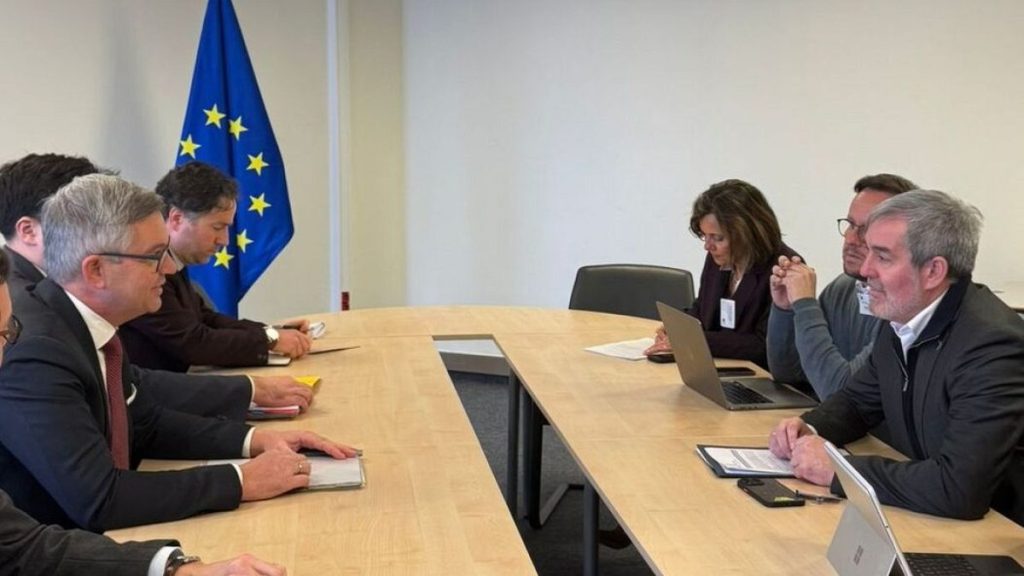The Canary Islands, a Spanish archipelago off the coast of West Africa, is grappling with an unprecedented surge in irregular migration, a crisis that its regional president, Fernando Clavijo, argues is being overlooked by the European Union. Clavijo asserts that the EU’s focus on stemming migration flows in the Mediterranean has inadvertently diverted the problem to the Atlantic route, leading to a record number of arrivals in the Canary Islands. This “balloon effect”, as Clavijo describes it, necessitates a shift in EU policy and a recognition that the migrant crisis is a European, not solely a Spanish, issue. He emphasizes the need for EU solidarity, arguing that migrants landing in the Canary Islands are effectively landing in Europe. This appeal for shared responsibility underscores the strain on the islands’ resources and infrastructure, particularly regarding the care of unaccompanied minors.
Clavijo’s meeting with EU Home Affairs Commissioner Magnus Brunner in Strasbourg served as a platform to voice these concerns and advocate for tangible solutions. The significant increase in arrivals via the Atlantic route, coupled with a simultaneous decrease in other migration routes into Europe, highlights the urgency of the situation. While other EU member states like Italy and Greece have experienced a decrease in irregular arrivals, the Canary Islands face an “absolute overflow,” with El Hierro, the westernmost island, bearing the brunt of the influx. This disparity further fuels Clavijo’s argument for a more equitable distribution of migrants across the EU and a greater commitment of resources to address the crisis. Brunner’s assurance to visit the Canary Islands to assess the situation represents a first step towards acknowledging the gravity of the situation.
The strain on the Canary Islands is particularly evident in the growing number of unaccompanied minors arriving on its shores. The Spanish constitution mandates that each regional community care for these children, placing a disproportionate burden on the limited resources of the islands. With over 5,800 unaccompanied minors currently in their care, and a thousand more expected to be granted refugee status, the Canary Islands are struggling to provide adequate support and care. This influx of minors, against the backdrop of a small island population and limited resources, is creating social and economic tensions, further highlighting the need for both national and EU-level intervention. Clavijo argues that concentrating these children in a remote and fragmented territory compromises their well-being and necessitates a more sustainable distribution mechanism.
To address this escalating crisis, Clavijo proposes a multi-pronged approach involving both national and European level actions. At the national level, he demands an automatic distribution mechanism for migrants when a region’s reception capacity is exceeded, an “extraordinary distribution” to relocate unaccompanied minors, and increased financial support from the Spanish central government. This call for immediate action reflects the growing tension between the Canary Islands government and Madrid over the allocation of resources and the perceived lack of support. The significant discrepancy between the funds received and the actual cost of caring for unaccompanied minors further underscores the financial strain on the islands.
At the European level, Clavijo’s demands focus on three key areas: the redistribution of migrants arriving in the Canary Islands among EU member states, the deployment of Frontex to the Atlantic islands, and increased cooperation with African countries to address the root causes of migration. He argues that distributing the minors across the EU is a manageable task and would alleviate the pressure on the Canary Islands. Furthermore, he emphasizes the need for Frontex’s presence in the Atlantic to enhance search and rescue operations and deter irregular departures. Finally, he urges the EU to prioritize the development of local economies in West African countries rather than solely focusing on border control, arguing that preventing people from seeking a better future is an unsustainable approach.
Central to Clavijo’s argument is the call for a more proactive and preventative approach to migration management, emphasizing collaboration with West African countries. He criticizes the delayed disbursement of promised EU funds to Mauritania, highlighting the need for swifter and more effective financial assistance to address the underlying economic drivers of migration. Clavijo believes that investing in local economies and creating opportunities within these countries is crucial to stemming the flow of migrants. This approach contrasts with the focus on border security and reinforces the idea that addressing the root causes of migration is more effective than simply trying to block migration routes.
The deployment of Frontex, the European Border and Coast Guard Agency, is another key component of Clavijo’s proposed solution. He advocates for Frontex’s presence on both the Canary Island shores and in West African countries. On the islands, Frontex could assist with search and rescue operations, while in African countries, they could collaborate with local authorities to prevent departures. However, deploying Frontex requires the cooperation of national governments, and in the case of deployment in third countries, complex agreements between the EU and the respective countries. While Commissioner Brunner has pledged to discuss the matter with Spanish authorities, the process of deploying Frontex, especially in African countries, remains a complex and potentially lengthy undertaking. This highlights the intricate web of legal and political considerations involved in addressing the migration crisis.

